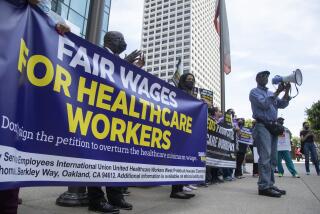Small Claims Is Likely Route to Get More Wages
Q I do home health care. In April, 1989, I went to work for an agency in Orange. The agency sent me to a private home in Ontario, and didn’t specify what I was making a day. I did, however, overhear a telephone conversation in which the woman from the agency said my starting wage was $60 to $90 per 24 hours depending on the amount of care given.
In May, 1989, I was told that I was no longer needed. I got my first paycheck, and I was shocked to learn that I was being paid only $45 per day.
I believe I was shorted on my pay. What can I do?
N.Y.,
Mission Viejo
A Your letter is not clear, but I am assuming that you were paid by the employment agency. There are a variety of ways you could handle your problem. You could consult an attorney or you could sue in Small Claims Court for the wages you feel are owed to you (no small claim can exceed $1,500).
You may also be able to have your case heard by the state labor commissioner. The labor commissioner’s office has an information packet which explains how and when you can file a claim. The packet is called Claims Processing Procedural Pamphlet, and is free to the public. The general information number for the Labor Commission is (714) 558-4114.
Q I live in a townhouse complex of 330 units whose association fee was determined by the number of bedrooms and square footage. Under this formula, the larger the unit, the bigger the fee.
Our CC&Rs; (covenants, conditions, and restrictions) used to provide that a 75% majority of the membership had to approve any changes to the CC&Rs.; Our board of directors, however, which consists mainly of owners of larger units, changed the CC&Rs; so that a simple majority vote is all that is required. The board then held a special election to change the association fee to a flat rate so that all members would pay the same amount. This change passed by a majority count, but fell far short of being the 75% majority required by the old CC&Rs.;
Many of the owners of the smaller units are retired and are on fixed incomes. We now feel helpless because the rule now allows the majority owners to mandate changes by simply changing the rules. We no longer feel we have any protection from future zealous or unscrupulous board members and/or homeowners.
What can we do, other than engaging in a costly court bout? Are there any regulatory agencies that oversee that CC&Rs; are not abused?
M.O.,
Huntington Beach
A As far as I am aware, there are no regulatory agencies which supervise the enforcement of CC&Rs.; Some knowledgeable people with whom I checked suggested that you might attempt to amend the CC&Rs; back to the 75% vote following the new procedures. They also suggested that you check the CC&Rs; regarding removal of board members. If your CC&Rs; do provide for such action, it would also govern the manner in which you should proceed.
Q I went to court to fight what I thought was a bad traffic ticket. I didn’t hire an attorney because I didn’t think I would need one and I didn’t want to spend the money. What a mistake! The police officer appeared with a deputy district attorney who questioned me like a criminal. Needless to say, I lost. Is this fair?
J.S.,
Tustin
A The reason that deputy district attorneys appear at traffic trials is to prevent the judge from becoming an advocate rather than a neutral listener of the facts. There are some courts which do not require them to handle traffic trials, but those judges must be careful that they do not become so involved in the questioning of the police officer or the accused traffic violator that they can no longer be considered impartial. As a result of this concern, most courts do have deputy district attorneys or law clerks who have received permission to appear in court to handle traffic trials.
More to Read
Inside the business of entertainment
The Wide Shot brings you news, analysis and insights on everything from streaming wars to production — and what it all means for the future.
You may occasionally receive promotional content from the Los Angeles Times.










